Annual Report 2021
February 4th, 2022 - written by: Migration-Control.info
Dear everyone,
For just over two years now, the Migration Control Project has been self-managed and collectively. As a network of committed people in Europe and Africa, we document how the EU outsources and externalises its borders and their "protection" and what consequences this has for people's freedom of movement. In this report, we want to look back at what we have experienced together in 2021 and what successes we have been able to achieve. You hear from us because you are connected to the project in some way - because you have critically prepared your knowledge in articles and thus made it understandable to the readers of our website; because you translate with your multilingualism and support that more people can read along; because you put your time into editing texts, writing financial proposals, coming to the coordination meetings every fortnight, answering emails, making contacts, because you accompany the work on the new website or because you build a new website for us; because you follow our work, support us with donations or funding. Because you are one of the people who stands up for freedom of movement! Thank you for making the project what it is.
We look forward to everything we create together in 2022!
Solidarity greetings
the Migration Control Coordination Group
Introduction of the project
The research collective Migration Control is a network of committed people in Europe and Africa that documents European externalisation policies and the resulting violations of fundamental rights, curates collected knowledge, critically processes it for a broad public, and makes it accessible online.
In summer 2016 an investigative team of the tageszeitung taz asked themselves what the European Union and its member states are doing to block migrants’ way to Europe and what consequences this has for the human rights of people on the move as well as local populations. This was when the Migration Control Project was born.
The project documented how billions of European development funds were diverted from projects and invested in migration control instead. In order to stop migration and flight movements already far before Europe's borders, the EU and its member states cooperate with autocratically governed states and dictatorships and, among other things, finance them to train and arm police and security forces. These developments are particularly problematic for the respect of migrants’ human rights and have not lost any of their relevance since the start of the project in 2016.
In 2019, due to the ongoing brutal externalisation policies of the EU, nine activists decided to continue the taz project as a collective documentation network. The aim was to show how regional developments are influenced by externalisation policies and the associated violations of human rights.
In doing so, we want to provide critical knowledge in order to add a critical perspective to the public discourse.
After taking over the project, we built the beta version of our own website, migration-control.info, and published it in February 2020. Our website includes a Wiki with reports on European migration control and its consequences in around 30 countries and regions in East, West and North Africa, as well as on relevant actors in the border regime, such as Frontex and national development agencies, such as GIZ. The contributions have been updated, expanded and continuously translated by members of the Migration Control Network of around 100 people, based on the contributions on the taz website. We have also launched a Blog, created an Archive and established our presence on Twitter and Facebook.
In addition, since October 2020, we have been publishing ongoing summaries and analyses of the most important developments in the European externalisation regime in our Monthly Review. While there is a lot of information and media attention on the topic of flight, migration, and dying in the Mediterranean, we create real added value through these new curated formats. In this way, we create synergies for social movements, for NGOs working on human rights violations along migration and flight routes, and provide interested people with a low-threshold entry into a complex topic.
Structure of Migration Control
The Migration Control Network is organised in various sub-groups, starting with the coordination group, which meets online every fortnight and publishes new articles on the website, organises events, publishes the Monthly Review and keeps track of the situation, through the blog group to the West, North and East Africa regional groups. The regional groups are responsible, among other things, for writing new articles from the respective regions and bringing together activists, researchers, and journalists from the regions concerned.
We are always looking for new people who are interested in writing reports. If you are interested, please contact us at contact@migration-control.info! Within the sub-groups, there are other small groups that deal with specific issues, such as the website or the financing of the project, which is financed by donations and project funding.
Beyond the various groups, there is a network of about 100 people who feel connected to the project in an individual way and contribute to it.
The Migration Control Project cooperates with various initiatives, groups, and organisations. These include Alarm Phone, borderline-europe e.V., No Border Assembly, migreurop, Statewatch, Sea-Watch, and the Global Detention Project. In previous years, funding was provided by Bread for the World, the Civilian Sea Rescue Foundation, medico international, the Rosa Luxemburg Foundation, and private donors.
Finance report: Use of Funds
In addition to private donations, the project received financial support from the Rosa Luxemburg Foundation in the amount of 20,000 € in 2021. With the help of the funding we were able to pay for the expenses of:
- authors of wiki and blog entries,
- translations into English, German, French, and Arabic,
- and for the revision of the website.
It is a particular concern of ours to enable activist participation in the long term. For this, a solidarity-based approach is crucial to enable diverse participation. We would like to thank you for all the donations and funding we received in 2021.
Outreach: Development of Clicks
We are very pleased that our commitment meets with interested readers. With 4,000 and maximum 6,000 monthly page views on our website, we have been able to significantly increase our outreach. While more than half of the clicks come from sources like google, and other search engines, the other half comes directly, or from friendly websites, or from social networks. This means that 2,000 of our readers know about our site and are looking for specific information, and many other readers are redirected via google research. Thus, besides working on our topics and present views from the South, the aspect of SEO is also important for our outreach.
What have we done in 2021?
The year 2021 was an exciting year for our project. We implemented a wide variety of ideas and projects. Below we give you an overview of the implementation of these ideas and projects:
Monthly Review
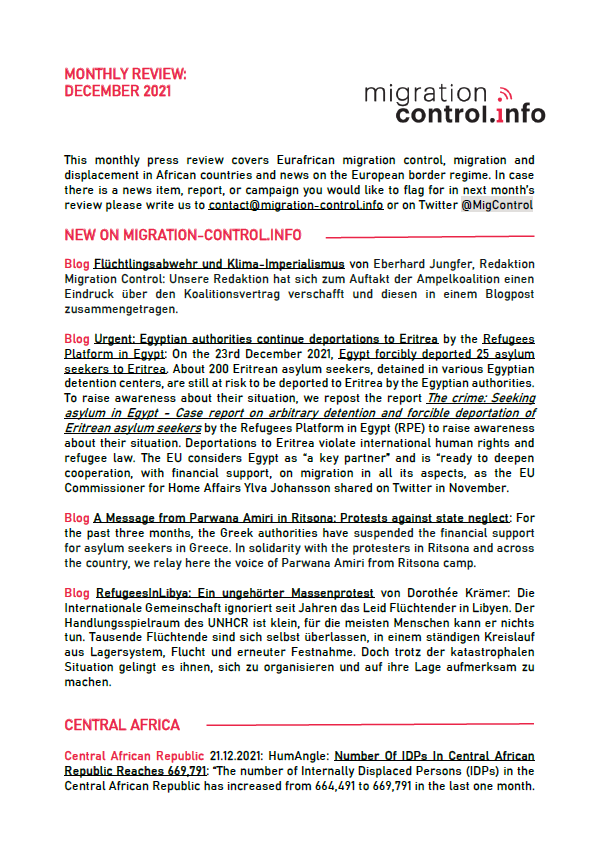
In October 2021, we celebrated the first anniversary of our Monthly Review, which we have been publishing since October 2020. In the Monthly Review, we provide an overview of current developments in European migration control and externalisation policies and refer to new wiki and blog entries on our website.This allows us to summarise relevant and current externalisation policies and their effects. In doing so, it is of particular concern to us not to structure the summary reporting in a Eurocentric way, but to reflect different perspectives and reports from different regions.
The Monthly Review also lists new reports published each month as well as upcoming campaigns and events. This year we highlighted three different "specials" in the Monthly. These aimed to give a detailed overview of the coverage of the situation in Afghanistan, Belarus, and Libya. The takeover of the Taliban in Afghanistan, the dramatic situation of the people in the Polish-Belarusian border area, and the ongoing protests of the @RefugeesInLibya in Libya were the reasons for us to focus on them in a "special" in the respective issues of our Monthly Review.
Wiki
In our Wiki, we provide an overview of the EU's externalisation mechanisms and their consequences in different states and regions. Furthermore, we present relevant terms, agencies, international organisations, and solidarity structures in the context of externalisation. We are constantly looking for potential authors to publish new entries and/or revise old ones. In 2021, we have managed to expand the wiki with the following entries:
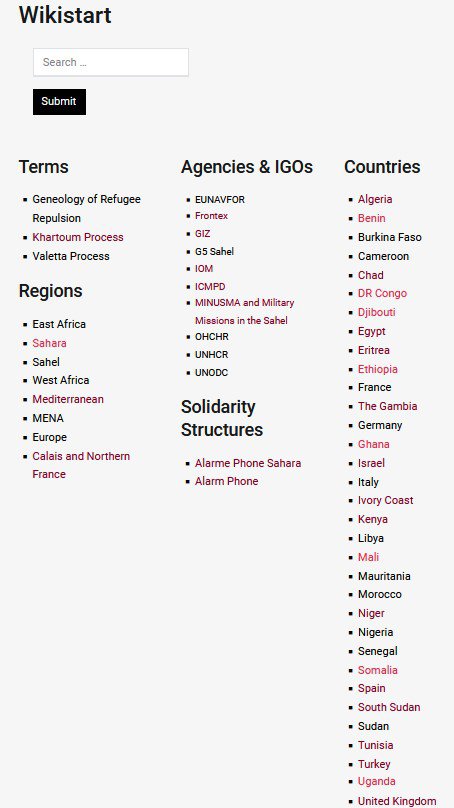
- Calais and Northern France by Thomas Müller, published in February 2021
- The Gambia by Judith Altrogge, Omar N. Cham and Franzisca Zanker with support from Rafael Hernández Westphal and Antonia Nölke, published in February 2021
- The German development agency GIZ by Naemi Gerloff, published in March 2021
- Minusma and Military Operations in the Sahel by Christoph Marischka, published in March 2021
- Khartoum Process by Louise Sullivan, published in May 2021
- Chad by Helga Dickow, published in May 2021
- United Kingdom by Helen Brewer, published in June 2021
- The International Organisation for Migration (IOM) by Inken Bartels, published in July 2021
- Israel by Judith Poppe, published in September 2021
- Genealogie der Flüchtlingsabwehr: Lager by Eberhard Jungfer, published in October 2021
- Uganda (updated) by Simone Schlindwein, published in October 2021
- EU by Christian Jakob, published in November 2021
Many thanks to all those who have been involved in the creation of these contributions: all the authors who have researched and written them; all the translators who have worked on making the site quadrilingual and thus making the information accessible to even more people; the editors who have got to the bottom of the smallest inconsistencies; the photographers who have illustrated the contributions; the activists who have shared insights into their work with us and all those who have helped to stand tirelessly in solidarity against Fortress Europe.
Archive
This year we managed to expand the archive, the planning of which started at the end of 2020. Our aim is to collect knowledge and give visitors to our website the possibility to access this collection. Now, at the end of the year, the archive counts 196 entries. Similar to the wiki, a distinction will be made between regions and emerging themes. Documents that we consider relevant to the discourse on externalisation processes are collected in the archive and thus permanently curated.
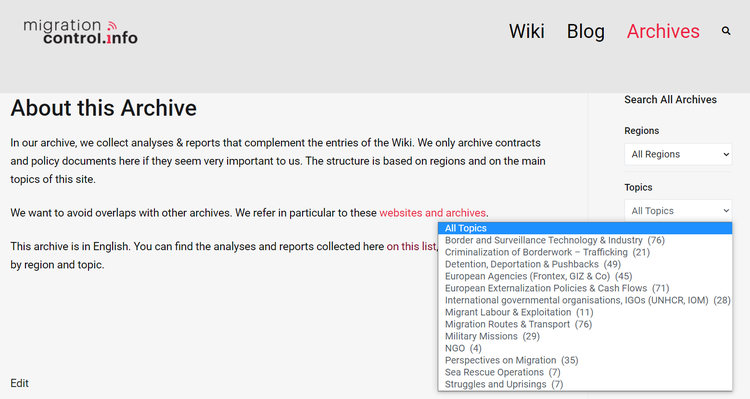
Blog
We have managed to expand our Blog this year. In 20 new blog posts, we were able to publish a range of different current issues in the field of migration and externalisation thanks to the work of critical authors. These were the following blog posts:
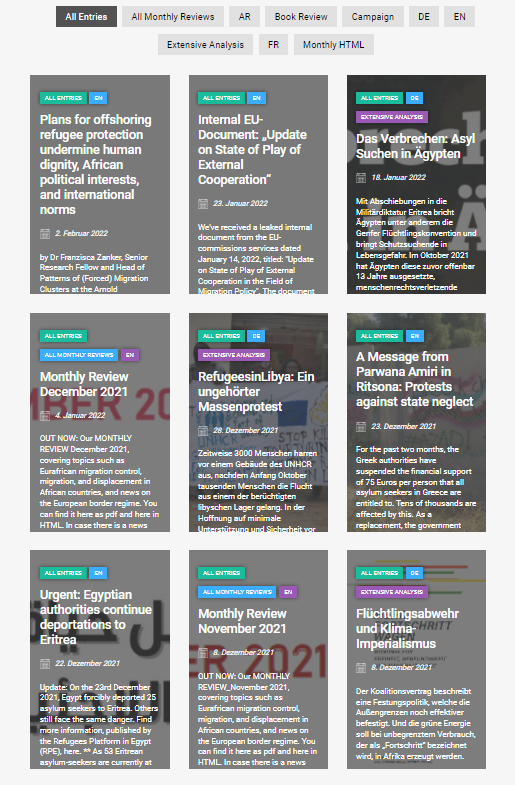
- Failing Nigeria once again - Views on the EU's New Pact for Migration and Asylum from Nigeria by Ngozi Louis Uzomah, January 2021
- Pushbacks at the EU's External Borders: The View from Serbia and Bosnia and Herzegovina by Reid Kelly, January 2021
- Going South by Christian Jakob, January 2021
- Migration und die Seinsfrage by Belachew Gebrewold, February 2021
- NGOs, Migration and externalisierung in Libya by Paolo Cuttitta, February 2021
- Early Developments in Migration Control: Migration Policy Categorisations in the Aftermath of the Recruitment Ban in West Germany by Tim Zumloh, March 2021
- Die Ertrunkenen im Mittelmeer. Anmerkungen zum Buch von Paolo Cuttitta und Tamara Last (Eds): Border Deaths. Causes, Dynamics and Consequences of Migration-related Mortality by Eberhard Jungfer, March 2021
- The Atlantic Route to Europe and the Border Regime in Mauritania by Hassan Ould Moctar, April 2021
- For nearly 50 days, undocumented migrants have been on hunger strike in Brussels by Charlotte Fichefet, July 2021
- Different realities: people on the move, NGOs and the UNHCR by Katharina Lobermeyer, August 2021
- (Further EU documents on the) Operationalization of the Pact: Niger, Libya, Morocco, Tunisia, October 2021
- New reception centre in Greece and the "limitation of primary flows" by Wasil Schauseil, November 2021
- Außengrenzen im Nordwesten by Thomas Müller, November 2021
- Emerging developments from the EU's Draft Action Plan for Nigeria by Kwaku Arhin-Sam, November 2021
- Frontex Deportations, November 2021
- New EU Documents on Frontex Return Operations, and Climate Migration, November 2021
- Flüchtlingsabwehr und Klima-Imperialismus by the Migration Control Editorial Group, December 2021
- Urgent: Egyptian authorities continue deportations to Eritrea by the Refugees Platform in Egypt, December 2021
- A Message from Parwana Amiri in Ritsona: Protests against state neglect, December 2021
- Refugees in Libya: Ein ungehörter Massenprotest by Dorothée Krämer, December 2021
Border Business List
In cooperation with Informationsstelle Militarisierung, this year we published the Border Business List, in which we collect and profile companies and corporations involved in and profiting from the technological upgrading of (pre-displaced) European borders. This list is designed as a collaborative project where people can get involved. Our aim is to constantly update and expand the list in order to be able to generate as diverse and comprehensive an overview of the business of exclusion as possible. A big thanks to all the individuals, groups, and social movements who have already compiled extensive information on this: Organisations like Statewatch and the Transnational Institute, individuals like Mark Akkerman, Martin Lemberg-Pedersen, and Matthias Monroy as well as activists and movements like the No Border Assembly Berlin. Do you have suggestions and additions or want to contribute? Then contact us via contact@migration-control.info!
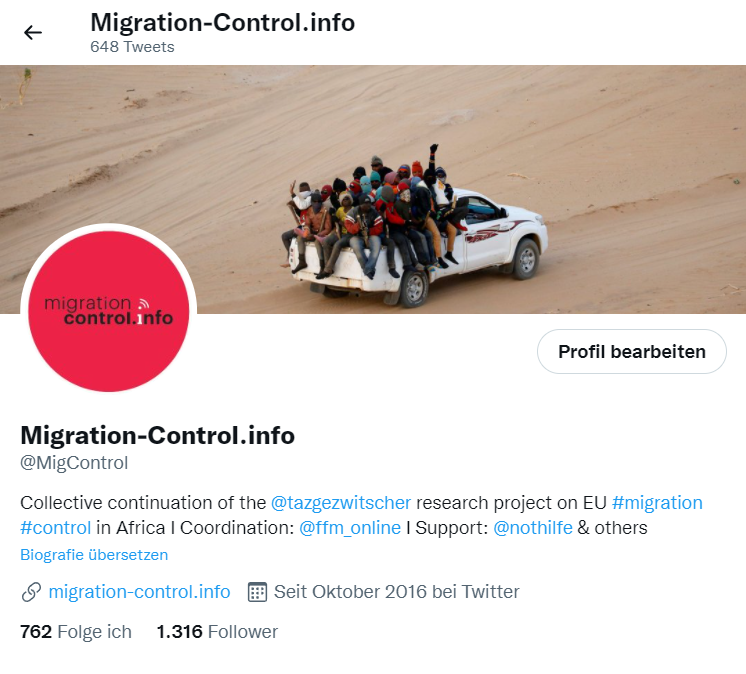
Twitter and Facebook
We have been sharing content on Twitter and Facebook since October 2016. This year we have found new followers through our presence in social networks and counted over 1,100 followers at the end of the year. We also currently have 935 followers on Facebook. The number of people who follow the project and our work closely is increasing.
Events
In 2021, we organised two round tables, bringing together activists, journalists, and researchers for an informal exchange on current developments in the European externalisation regime. In January, with seven participants and a small audience, we discussed the political and social situation in Tunisia, migration from, to and through Tunisia, deportations from Italy to Tunisia, and the interests of the EU. In March, we had a small roundtable discussion on the socio-economic and legal situation of people on the move in Egypt, the role of the UNHCR, deportations and so-called "voluntary returns", and European cooperation with Egypt. The roundtables were not open to the public for the time being, to test the format, but also because we want to promote informal, confidential exchange between actors who research, write about, and oppose European externalisation policies in solidarity. We plan to open it to the public in the future. We would be very happy to receive support in organising these online events!
Feel free to contact us at contact@migration-control.info!
Hybrid plenary on externalisation with Dakar and Palermo and upcoming meeting in February 2022
From 15-19 September 2021, the activist "Palermo and Dakar Convergence" took place, bringing together people in both Palermo and Dakar in presence and together online. Several activists from the Migration Control Project were present in Palermo and Dakar and jointly organised an exchange plenary on externalisation, which took place simultaneously in Palermo and Dakar and was connected via video. Activists from different border regions gave an insight into the respective problems and repressions that are currently occurring in the context of externalisation, depending on the location. We will continue the exchange that started in September, in February 2022 on the question "How do you stand up against the European externalisation regime?"
BUKO 39, 12 June 2021
At the 39th congress of the Bundeskoordination Internationalismus we were also present with a workshop on externalisation. In the first part of the workshop, we looked at current developments of externalisation policies and their consequences in North Africa, Sudan, and the Sahel. In the second part, we presented the Migration Control project and reported on our working methods, successes and difficulties. Afterwards, we opened the discussion - for exchange of experiences and questions, to win comrades-in-arms and to discuss together the positioning of our project in the anti-racist movement.
Closed meeting Migration Control, 17 April 2021
In April, we came together with about 15 people for a one-day closed meeting to discuss some strategic questions and to discuss our goals. Among other things, we thought about what the benefits of Migration Control are; what exactly is our "niche" in the network of all organisations working on flight and migration; who we actually want to address with the project, and what the next steps for this are. Find the minutes here!
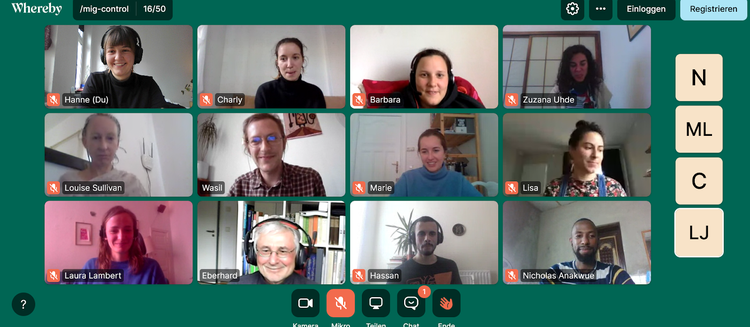
Campaigns
This year we were able to publicly support the following campaigns:
- Free the Samos 2/ Campaign and Solidarity Statement for N. & Hasan by Borderline Europe, November
- Petition for Feminist Asylum, November (signed)
- Abolish Frontex
Outlook
In the long term, it is a great concern of ours to spread the coordination work over a larger number of people. Due to the financial support of the Rosa Luxemburg Foundation and donations, areas such as the translation of articles can be handed over to external people for the time being and thus no longer fall within the scope of our coordination work. Nevertheless, it is our concern to increase the network and the number of people actively involved and to maintain the project as sustainable as possible. Future financial support plays an important role in this, and we will also be dealing with this issue in the coming year.
The coordination group is planning an internal two-day meeting where we will look back on the past months and discuss the direction we want to take with the project. It is important for us to take into account current developments in externalisation processes and to continue to create added value through our work. In order to realize this, we plan to enter into an exchange with regional and supra-regional movements, groups, and activists.
We are also actively working on the completion of our new website. On the other hand, we want to expand our cooperation with translators so that more contributions can be professionally translated and published in several languages. We also plan to found the regional groups "North Africa" and "EUropa", which do not exist yet. If you would like to help observe and document the consequences of Europe's externalisation policies and would like to join one of these working groups, please contact us at contact@migration-control.info!
Finally, we would like to say a big thank you to all the people who have contributed to the existence of our network in various ways. Thank you to all the readers, donors, advisors, translators, speakers, and all the other people who have contributed in various ways through their solidarity so that the project can and will continue to be present in the coming year!